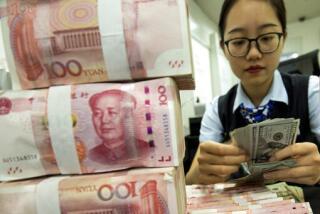U.S. Brokerages Chasing Hong Kong Bulls : Markets: The Colony’s growing ties to China have made it a financial center. Americans are rushing in to make the most of it.
- Share via
HONG KONG — Lured by China’s booming economy and by healthy growth elsewhere in Asia, American investment banks and brokerages are expanding rapidly in Hong Kong and, reminiscent of Wall Street in the 1980s, fiercely competing for the best deals and the best talent.
In the past year, Bear, Stearns & Co.; Lehman Brothers; Goldman, Sachs & Co.; J.P. Morgan; Morgan Stanley & Co., Salomon Bros. and Smith Barney, Harris Upham & Co. have either opened new offices or vastly expanded their operations in the Colony.
The American buildup reflects the changing financial landscape of Asia, in which Hong Kong has turned from a manufacturing center into a hub of management, design and finance.
Hong Kong’s evolution results in part from China’s economic reforms and the growing economic bond between the Colony and the Chinese mainland. Hong Kong’s stock market is booming primarily because of foreign investors’ desire to get a piece of companies linked to the boom in China.
“There’s a lot of investors willing to invest in the Hong Kong market, so you have the perfect situation where you have capital suppliers and capital needers,” said a spokesman for Morgan Stanley Asia in Hong Kong. “And, obviously, acting as an intermediary creates unique opportunities. . . . There is a potential for investment banks in this region to do amazingly well.”
“(Hong Kong) today is a window into the booming markets of China,” said John Wadsworth, managing director of Morgan Stanley Asia. “It is a very convenient place to be doing business now to take advantage of the growing markets of non-Japan Asia.”
Japan’s economic slowdown has also been a factor in the new American interest in Hong Kong’s financial sector.
“The opportunity in Asia in the ‘80s was to intermediate the flow of capital out of Japan,” Wadsworth said. “But that particular game is over, and the ‘90s will be driven by the opportunity to intermediate capital into China.”
Still, the new American players in Hong Kong are finding that it isn’t always easy to get into the game. Competition is stiff among the U.S. firms in recruiting qualified staff, particularly experts on China. Poaching from established firms has become the preferred method of recruiting, according to stories circulating in the financial community here.
“In the early stages of any major evolutionary change in a market, you do get raiding and you do sometimes see unrealistic compensation being offered. . . . I guess we’ve seen a bit of that in Hong Kong,” said William Phillips, managing director of Salomon Bros. Hong Kong.
Salomon hired Phillips, former managing director of Baring Securities (HK), a year ago to head up its new Asia equities division.
“The Wall Street firms have a level of expertise which is particularly unmatched by any of the U.K. investment houses, in my opinion,” Phillips said. And given their access to capital, he said, “they’ll give the more established players here a really good run for their money in the next five years.”
Added Thaddeus T. Beczak Jr., chairman of J.P. Morgan’s management committee in Hong Kong: “The market here has become very competitive. There are a number of firms who are trying to buy business, and there are a number of firms who are also trying to buy talent.” J.P. Morgan has more than doubled its corporate finance staff and has put together an Asian equities department.
For example, Salomon Bros., which has about 150 professionals in Hong Kong, plans to hire about 50 more over the next 12 months.
But the big question is whether Asia’s economic growth, particularly that of China, will provide enough business to support the expanding presence of U.S. investment banks in Hong Kong.
“Over the years I have heard a lot of developing-country macroeconomic stories, and a couple of times even been present at the creation of bull markets, but the China story is the best and the brightest,” Morgan Stanley’s global strategist, Barton Biggs, wrote after guiding senior U.S. and European fund managers on a tour of China in September.
“After eight days in China, I’m tuned in, overfed and maximum bullish,” Biggs said.
More to Read
Inside the business of entertainment
The Wide Shot brings you news, analysis and insights on everything from streaming wars to production — and what it all means for the future.
You may occasionally receive promotional content from the Los Angeles Times.









